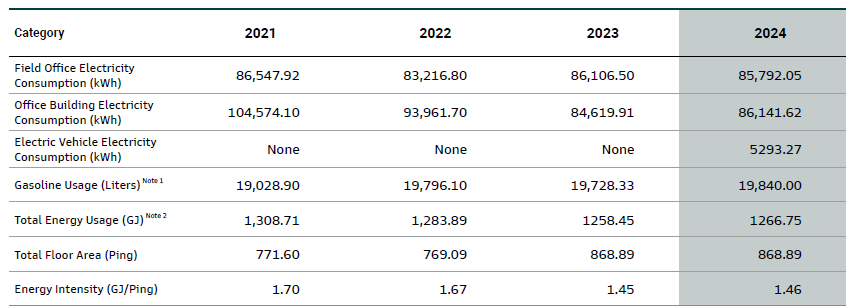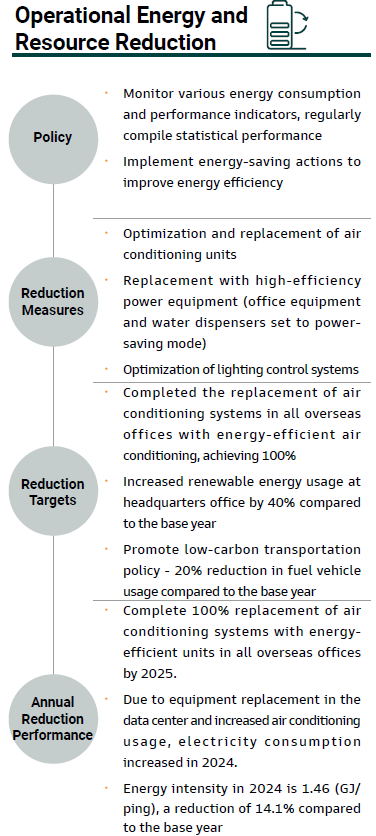Energy Management ┃ Management Approach
Significance and Meaning to the Company
- Based on the concept of environmental sustainability,Novatech strives to reduce environmental impacts from product design, services, activities, and production. We are committed to complying with energy-related regulations and addressing stakeholder needs by executing an energy management system to create a green and energyefficient environment.
Management Strategies
- Strictly adhere to domestic and international environmental protection standards, comply with all energy and carbon management regulations, with the goal of zero violations.
- Identify risks caused by climate change, mitigate them,and disclose relevant information.
- Set short, medium, and long-term energy conservation and carbon reduction goals by formulating practical approaches and promoting reduction measures.
Description of actual and potential negative and positive impacts
Positive:
- Effectively implementing energy management and conservation reduces corporate operating costs,generates carbon reduction effects, and lowers the risk
of power shortages at operational sites. Improve the Company's energy efficiency and implement energy conservation and carbon reduction.
Negative:
- High energy-consuming enterprises that fail to implement energy-saving measures lead to increased electricity consumption, resulting in higher electricity costs and negative environmental impacts. Failure to properly manage energy resource consumption increases operational costs and the risk of operational disruption.
Action Plans/Resources
Establish a legal and effective environmental management system to promote the implementation of various environmental protection and safe production activities.
- Implement electronic E-process to reduce electricity consumption and carbon dioxide emissions.
- Implement monitoring to reduce electricity usage and conduct regular carbon inventories.
- Promote Green Office energy-saving and carbon reduction initiatives.
Policy/Commitment
- Improve energy efficiency and effectiveness by setting green procurement items for office equipment and supplies.
- Regularly audit and review the quality and effectiveness of environmental management, evaluate and implement improvements.
- Continue implementing energy conservation and carbon reduction measures while promoting energy management to achieve carbon reduction goals.

* This material topic has no actual activities or business relationships involving negative impacts in the current year.
Historical Energy Use and Energy Intensity
Novatech is committed to practicing energy conservation,protecting the Earth, and cherishing resources by incorporating environmental protection and energy saving into its operations.In addition to actively promoting office energy-saving concepts,we also encourage employees to participate in energy-saving and
carbon reduction self-management activities. To ensure efficient energy usage, Novatech regularly conducts inventory and reviews various energy consumption situations.
Due to industry characteristics and operational constraints,Novatech's energy usage is relatively simple compared to traditional manufacturing or other industries. Primary energy consumption is concentrated in office electricity usage and fuel consumption from official vehicles. The energy usage calculation scope covers Novatech's office locations in northern, central,and southern Taiwan, including Zhubei office, Linkou, Zhongli,Taichung, and Tainan field offices. Novatech's electricity demand is for office administrative use, where reduction potential is limited, making the Company reliant on green electricity to achieve reduction targets.
In 2024, Novatech encouraged the leasing of electric vehicles as the preferred option for official vehicles. The Company has converted two official vehicles to electric vehicles and will gradually increase the proportion of electric vehicles in the future.The Zhubei office is also considering installing solar panels on the rooftop to effectively reduce greenhouse gas emissions.Meanwhile, Novatech regularly reviews per capita electricity consumption to clarify the company's current electricity usage situation and works together with colleagues, hoping to reduce per capita electricity consumption year by year.
We plan to adopt the ISO50001 Energy Management System in 2025 to develop comprehensive energy efficiency monitoring and measurement standards, aiming to achieve continuous energy improvement and enhance energy performance. Through efficient energy use, we can reduce organizational costs and enhance
customer trust in the Company and its products and obtain thirdparty international certification by May 2026.
Novatech conducts greenhouse gas inventory and management in line with the ISO14064-1:2018 greenhouse gas inventory standard. Compared to last year, Novatech's energy usage and intensity both increased in 2024. Since 2023,Novatech has included Category 9 downstream transportation under Scope 3 in the inventory scope. Scope 3 covers all other indirect emissions generated from upstream and downstream activities across the corporate supply chain,making it the most complex scope in GHG and typically accounting for the largest portion of a company's overall carbon footprint. Due to its extensive coverage, numerous emission sources, and difficulty in tracking and inventory, it requires joint efforts with suppliers to work towards the goal of a low-carbon supply chain.
Historical Energy Usage and Energy Intensity

• Note 1: The gasoline consumption of official vehicles is calculated based on the average price of 95 unleaded gasoline in 2022 (NT$31.09/liter) announced by the Petroleum Price Information Management and Analysis System of the Energy Administration, Ministry of Economic Affairs (https://www2.moeaboe.gov.tw/oil102/), using refueling expenses. Refueling expenses include the number of liters of gasoline for official vehicles. In 2023, the aforementioned calculation method was revised to principally use the actual number of liters of gasoline refueled for official vehicles. Starting from 2024, electric official vehicles have been leased.
• Note 2: For conversion factors, purchased electricity is calculated at 3.6 GJ/thousand kWh, while diesel and gasoline conversions are based on the heat values from the Energy Products Unit Heat Value Table published by the Energy Administration, Ministry of Economic Affairs in 2020.

